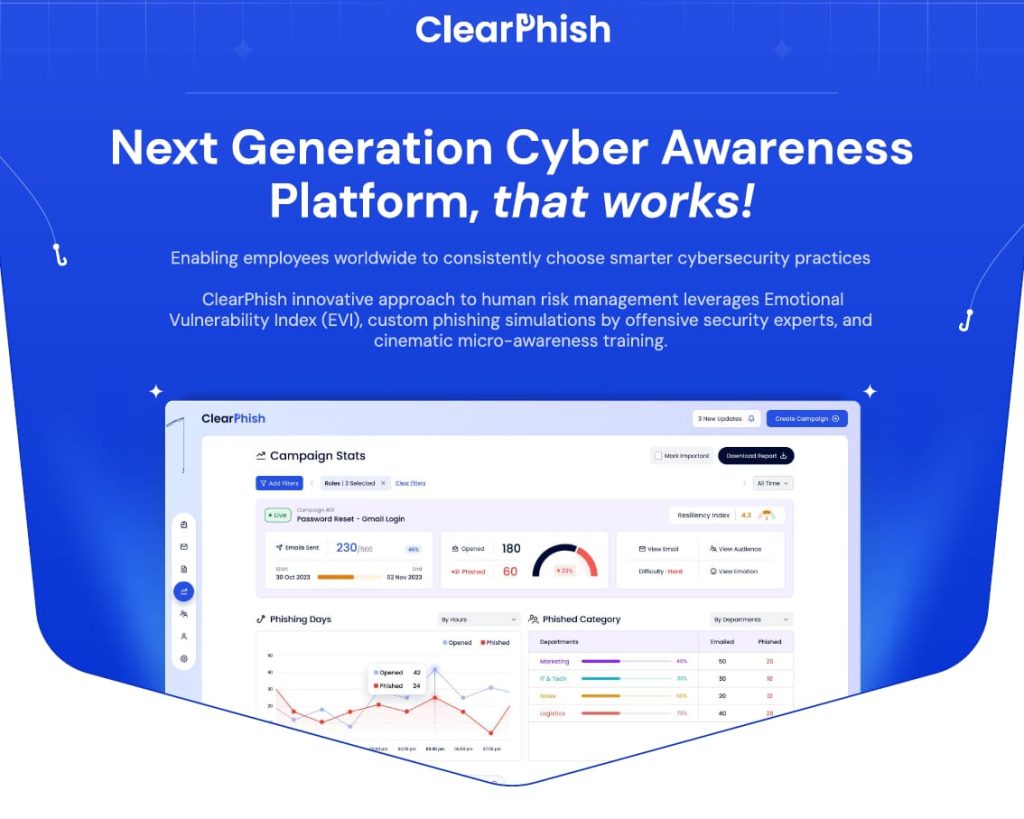
“95% of cybersecurity breaches are caused by human error.” – World Economic Forum
As cyber threats grow more sophisticated in 2025, organizations are doubling down on firewalls, encryption, and AI threat detection. But even the most advanced technical defenses can crumble with a single careless click. Human error in cybersecurity continues to be the most exploited vulnerability — and all signs point to it remaining the leading cause of data breaches this year.
Whether it’s falling for a phishing email, misconfiguring security settings, or using weak passwords, the human factor persists as the common denominator in security failures. So, what can organizations do differently in 2025?
It’s time to pivot from a tech-only mindset to a human-centered cybersecurity approach — one that places people, behavior, and psychology at the heart of defense strategies.
From Firewalls to Feelings: Human-Centered Cybersecurity Explained
Traditional cybersecurity emphasizes tools: endpoint protection, network segmentation, MFA. While essential, these tools often ignore the human behind the screen. Human-centered cybersecurity acknowledges that employees are not just users — they’re the first line of defense and the most targeted attack vector.
Key differences:
| Traditional Cybersecurity | Human-Centered Cybersecurity |
| Focus on technical controls | Focus on human behavior and awareness |
| Reactive threat detection | Proactive behavior change and risk reduction |
| Generic, annual training | Ongoing, personalized learning experiences |
| One-size-fits-all protocols | Empathy-driven, emotionally intelligent training |
Humans aren’t perfect — they’re emotional, busy, and prone to mistake. Hackers know this, and that’s why social engineering tactics continue to evolve. In response, cybersecurity must evolve too, treating users not as liabilities but as trainable assets.
Phishing Simulations: The Frontline Against Social Engineering
In 2025, phishing remains the most effective and widespread form of attack. From deepfake voice scams to hyper-personalized spear phishing, social engineering has entered a new era. Static training modules can’t keep up — but phishing simulations can.
Simulated phishing campaigns help employees recognize threats before they happen in real life. These campaigns are most effective when they are:
- Hyper-realistic: Mimicking actual tactics used by modern threat actors
- Adaptive: Tailored to roles, industries, and known vulnerabilities
- Timely: Embedded in daily workflows for contextual learning
Emotional Vulnerability: The Overlooked Risk
Cyber attackers don’t just exploit technical gaps — they exploit emotional ones. Urgency, fear, curiosity — these emotional triggers increase the likelihood of a user falling for a scam.
This is where emotional vulnerability insights play a critical role. By analyzing how users respond under emotional pressure, organizations can:
- Identify high-risk individuals and departments
- Deliver targeted training that resonates with user behavior
- Reduce risk at the individual level, not just organizationally
Case in Point: The Power of Realistic Cyber Awareness Training
Let’s look at how human-centered, simulation-driven training makes a difference in real-world environments:
Financial Firm Slashes Phish Click Rate by 65%
A mid-sized financial services company ran monthly phishing simulations across all departments. They also implemented ClearPhish’s Story-Based Micro Cyber Awareness Modules — short, cinematic training sequences based on real breach scenarios. The results:
- Initial phish click rate: 48%
- After 3 months: 3.5%
- Employee feedback: 4.9/5 rating on training relevance
Healthcare Provider Boosts Reporting by 3x
A healthcare organization struggling with under-reporting of suspicious emails used ClearPhish’s Emotional Vulnerability Index (EVI) to identify emotionally triggered users. By tailoring micro-training and reinforcing empathy-based scenarios, their incident reporting tripled — a clear sign of improved cyber vigilance.
ClearPhish: Taking Employee Cyber Training to the Next Level
At ClearPhish, we believe cybersecurity isn’t just about stopping threats — it’s about transforming culture. Our tools are built with the modern workforce in mind, focusing on emotional intelligence, behavioral science, and immersive learning.
Why organizations choose ClearPhish:
Hyper-Realistic Simulations
Our phishing simulations mirror real-world attacks using psychological tactics employed by today’s threat actors. No boring, outdated email templates — only authentic experiences that challenge users.
Story-Based Micro Cyber Awareness Modules
Short, engaging, and deeply relatable, these cinematic modules teach cyber concepts through story-driven lessons that employees remember and apply.
Emotional Vulnerability Index Scoring (EVI)
We go beyond clicks and metrics to analyze how emotion impacts user decisions. This allows for smarter, more personalized training interventions.
Real-Time Feedback Loops
Users receive immediate, contextual feedback after simulations, reinforcing learning when it’s most impactful
Human Error Is Here to Stay — But So Are Solutions
In 2025, technology alone won’t save your organization. The most effective cybersecurity posture is one that integrates humans into the loop — not as obstacles, but as empowered defenders.
By investing in phishing simulations, behavioral insights, and emotionally intelligent training, organizations can drastically reduce the risks posed by human error.
Ready to Strengthen Your Human Firewall?
Explore how ClearPhish can help your organization combat human error in cybersecurity with next-gen phishing simulations and emotionally-aware training tools.
Visit ClearPhish to see our platform in action and book a personalized demo.

